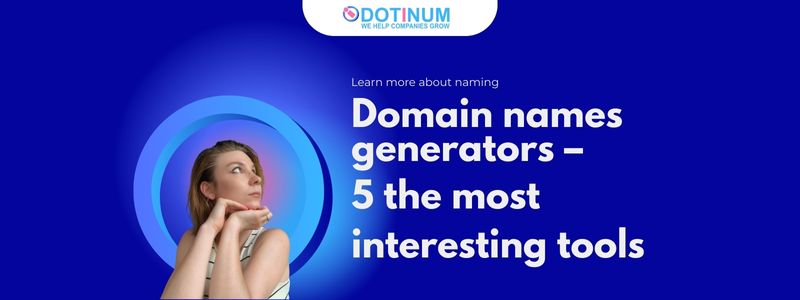TL;DR This article explores what abstract company names are, why they’re often misunderstood, and how they can become powerful branding tools. You’ll see examples of well-known brands with abstract names, learn about their hidden meanings, and discover why unique naming strategies can make your business stand out.
The famous saying by the Roman comedy writer Terentius “I am a human and nothing human is alien to me” also translates into the naming world. Distrust, distance, limited trust in a company that has a “strange” name is, in a way, understandable. The human brain adjusts itself positively to the symbols it had dealt with before and the other way round – it builds a defensive wall to ward off the unknown. All cultural codes functioning in a given community build bonds that identify and strengthen it at the same time.
Similar cognitive patterns can be clearly seen in the area of naming companies and products. This is because the most common names are descriptive and associative. Names based on surnames, places, historical figures and symbols are also popular. On the other hand, names that are artificial and lack clear meaning are rarely encountered.
I keep hearing that a unique company name can increase sales. But when it comes to making the final decision, people pick a brand name that evokes industry associations, uses a specific feature, contains someone’s personal name or refers to a place.
Why does it keep happening? Is it an abstract name that doesn’t refer to anything specific undesirable in the realm of meaningful names?
I will answer this question and I hope I will pleasantly surprise you.
Why abstract names are rarely chosen
What is an abstract name? For example: Asana, Asics, Crocs, Erli, Joop!, Knauf, Kodak, Muro, Nudo, Oppo, Pepco, Roomba, Trello, Yope, Zozole are names that mean nothing specific. At least theoretically (but I will discuss it later). In other words, an abstract name consists of a set of speech sounds or syllables that creates a word structure without a specific meaning. The result is a neologism, a word that has not existed before, or at least does not exist in a given market category.
Theoretically, it seems that abstraction is the easiest method of creating an interesting naming idea for your business, especially when dealing with a product or service.

A unique brand name increases the chance of attracting attention. Strengthened by an appealing visual form, it becomes more distinguishable. And if its communication is interesting, unconventional, and captivating, we are dealing with something that is sure to attract attention and stand out against the competition.
However, in practice, it is not so easy to create an abstract name. Since we are creating something artificial, this cluster of syllables should be constructed in a manner that meets the norms of a catchy name:
- easy to pronounce,
- simple to write down,
- without Polish letters (optional),
- attention-grabbing,
- visually attractive,
- with a free .pl domain (or other),
- free from legal defects.
The point is to make the spelling and phonetics friendly, so that it does not cause problems when it comes to reading or pronouncing it. Take a look at these examples and admit that they are attractive: Asana, Blik, Cisco, Galilou, Homla, Klarna, Kodak, Nozbe, Oreo, Pepco, Rexona, Twingo.
Do abstract names really mean nothing?
And here comes the somewhat obvious advantage of the abstract name. It is not true that it means nothing. Usually, but not always, there is a meaning behind a given abstract name. It’s more or less literal, but it is there. If you do not believe me, I will convince you with the explanations below:
- Asana (a project management system) derives its name from the positions assumed during yoga practice,
- Blik is a blend of the words close (pl. “blisko”), link, click,
- Cisco derives from the name of a city: San Francisco,
- Crocs came to the founder’s mind when they looked at their flip-flops from the side and thought they resembled a crocodile’s snout https://1000logos.net/crocs-logo/
- Klarna (Swedish fintech company) means clear, to become clear, brighten up in Swedish,
- Strava App –Swedish verb for strive, which epitomises our attitude and ambition (verb meaning to make great efforts to achieve or to obtain),
- Twingo (a Renault model) is a blend of the names of the dances: twist, swing, tango.
It is true, however, that the names Etsy, Flickr, iossi, Kodak, Oreo, Oshee, Spotify, Trello, Zappos, Zippo have been artificially created.
When do abstract names seem “strange”?
When categorising a name, it is easy to fall into a cognitive bias where we compartmentalise something that is strange or artificial into the category of neologisms.
I have experienced it when I convinced myself about the artificiality of the following brand names: Asics, Acer, Duka, Durex, Miele, Pepco, Rossignol, Yahoo!. It turns out that each of them has a meaningful etymology. And so:
- Asics is an acronym based on the saying “anima sana in corpore sano”, transformed from the original “mens sana in corpore sano” – meaning “a sound mind in a sound body”,
- Acer in Latin means “sharp, acute, able and facile.” “Acer has also been translated as keen, eager, severe and fierce, and it also has some other odd connotations attached to the word, associated primarily with the Maple tree.”
- Duka in Swedish means to arrange the table with dishes and cutlery.
- Durex consists of the words DUrability, Reliability and EXcellence,
- Miele indeed means honey in Italian, but the real genesis of the brand is very simple and comes from the surname of the company’s founder, Carl Miele,
- Pepco derives from the name Pepkor, which took over its origin from the PEP Stores chain,
- Rossignol is derived from the Old French word rossinhol meaning nightingale,
- Yahoo! comes from the phrase Yet Another Hierarchically Organized Oracle.
It happens, however, that the person designing the name receives guidelines to make it one-of-a-kind. And if a free .com domain is required too, it is safe to assume that the target name will not consist of a melodic set of syllables. This is often the case. I have nothing against brand names such as Appoco, Capterra, Exex, G.I.L.I., Hekko, Hestra, Inuikii, Ksubi, Lalaloopsy, Oshee, Robyg, Ryzen, Silxo, Syoss, YNIQ, Xioxi, Xicorr, Zazzle, because each of them surely met the expectations of their owners, since they chose them to be their brand names.
However, I believe that an interesting origin of the name becomes a substitute for creating an engaging story about the brand.
Storytelling and the power behind brand names
Storytelling is a keyword that very often pops up during the course of creative works on the brand and its communication strategy. It is a good move to include the information about the origin of the brand’s name in the storytelling process. The more interesting the story, the better. Even a simple explanation of a name’s origin will have an advantage over a brand name that was simply coined. People like discovering secrets. Each little tidbit of information about this secret explained in the “About us”, “Who are we”, “Our history” sections will add a human touch to the brand. Such approach makes it less artificial.

Here we come back to the question asked at the beginning of the article: Why are abstract names not very popular?
The answer is obvious. It is not true that this naming technique is avoided by brands. The slogan “unique company name” even encourages the creation of artificial verbal forms, more enigmatic ones, names that stand in contrast to the prevailing trend in the industry. Rather, it is the creators who do not realise that they are creating an abstract name. Their mode of thinking runs along the lines of: “oh, this is a nice idea with an interesting etymology”. But, as it turns out, that the majority of brand users have no idea that its name has a story behind it. See if you knew that:
- The name Chlochee (cosmetics) comes from the French noun cloche (bell),
- Lay’s is derived from the name of the company’s founder Herman W. Lay (in Great Britain, the Lay’s brand is sold under the name Walkers, in Brazil as Elma Chips),
- Lilou (jewellery) is the diminutive of the name Lilian,
- G.I.L.I. (fashion) comes from the brand’s tagline It Love It,
- Max Factor, the company’s founder, Maksymilian Faktorowicz, produced the first make-up foundation for everyday use (he was born in Łódź, Poland),
- Venmo (financial service) consists of the words vendere (Latin word meaning to sell) and mobile,
- Volvo in Latin means to turn, roll, wheel, coil,
- Xioxia (formerly Toshiba Memory) is a combination of the Japanese word kioku, meaning memory, and the Greek word axia meaning value.
There is also a second group of creators who knowingly hide the origin of the brand name. Knowing its meaning is the key to finding yourself in the world of loyal fans of the brand. And thus:
- Adobe – the name of the company was taken from the Adobe Creek River, which was located near the house of Charles “Chuck” Geschke, the founder of the famous Adobe,
- Mudita (Polish brand of phones) comes from the Buddhist term appreciative joy which comes from the well-being of other people,
- Oshee is an abbreviation of the words opportunities, sport, health, energy, emotions,
- Skype – the company name started out as Sky-Peer-to-Peer, after which it was shortened to Skyper, then to Skype,
- Sonos is not only a palindrome (a word that reads identically backward and forward), but also comes from the Latin word sono, meaning to make tones, to ring, to sound (by the way, the name Sony also derives from this verb),
- Strava is a Swedish word meaning to strive for something, to try to do something.
Conclusion – are unique company names worth it?
It turns out that abstract names do not bite. The conclusion that arises after reading this article is that, in spite of appearances, there are few truly abstract, artificially created names. It turns out that most of the brand names that surround us hide at least a grain of personal meaning. Regardless whether it concerns the product’s function, responds to personal or professional aspirations, or simply contains a hint regarding the place of origin or the founder’s history – we have many sources to draw from when coming up with different naming ideas. As a result, it often turns out that what was supposed to be artificially named has the hallmarks of an associative or even descriptive name. I have presented both of these naming techniques in previous articles, which I strongly urge you to read.
FAQ
What is an abstract company name?
An abstract company name is a unique, invented word or neologism with no direct meaning, often designed to stand out and be memorable.
Do abstract brand names work better than descriptive names?
Abstract names can be more distinctive and easier to trademark, but descriptive names are often easier to understand immediately. The best choice depends on your strategy.
What are examples of abstract brand names?
Examples include Asana, Klarna, Trello, Oreo, and Spotify. While they seem meaningless at first, most of them hide an interesting etymology or story.
How do I create a unique company name?
Focus on making it easy to pronounce, visually appealing, legally available, and ideally with a free domain extension like .pl or .com.